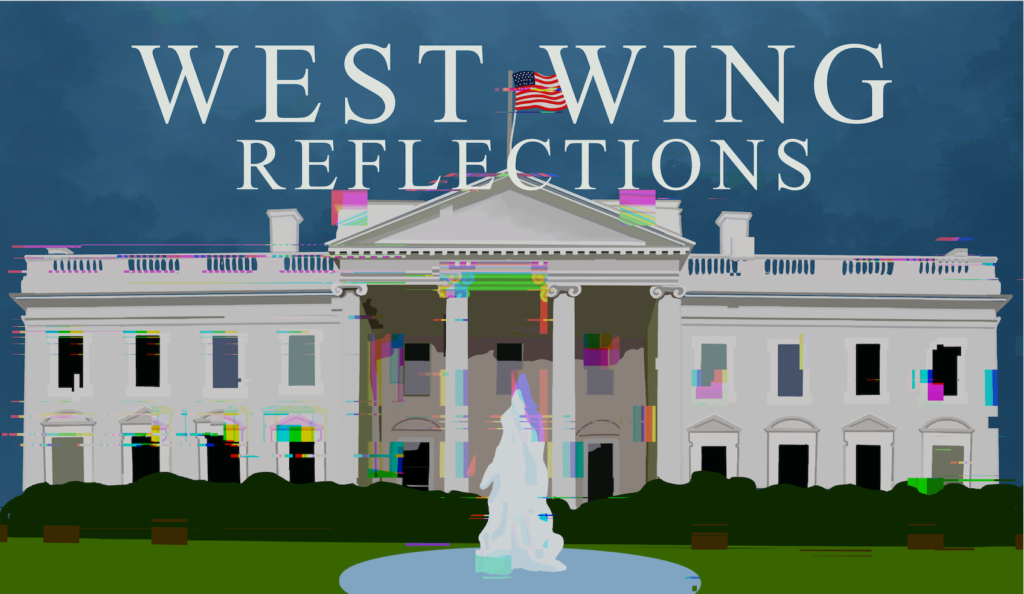West Wing Reflections: Women’s recent gains in politics mirror show’s nomination of female chief justice
(Courtesy of NBC)
By Alex Driscoll
Nov. 19, 2020 11:11 p.m.
Garnering 95 Emmy nominations and 26 wins in its seven seasons, “The West Wing” is an NBC television drama that depicts an era in which the president of the United States is a Catholic Democrat and Twitter does not yet exist. Though it premiered back in 1999 and ran until 2006, columnist Alex Driscoll dives into various episodes of the series, putting a twist on a typical review with analysis on how the show reflects today’s political climate.

Who runs the world?
After this year’s winning presidential ticket, it might just be the girls.
2020 has seen a multitude of firsts, and while not all of them have been positive, electing the first female vice president feels like a silver lining in the male-dominated landscape of American politics. But in the context of the ’90s, “The West Wing” finds its own version of female achievements in “The Supremes” – the 17th episode of season five.
Opening with the death of an associate justice to the Supreme Court, much of the episode is devoted to President Josiah Bartlet (Martin Sheen) screening nominees for the seat of the late conservative Supreme Court justice. Relying on the full force of his staff, Bartlet initially plans on nominating the moderate judge Elijah Bradford Shelton (Robert Picardo), whose clean record will make for easy confirmation.
But when Communications Director Toby Ziegler (Richard Schiff) and Deputy Chief of Staff Josh Lyman (Bradley Whitford) meet with leftist Judge Evelyn Baker Lang (Glenn Close), they’re left speechless by her charming eloquence. Emmy Award winner Glenn Close gives one of the best guest appearances on the show to date, and her gravitas pervades through the matter-of-fact tone of her character.
Judge Lang soon changes the course of Bartlet’s Supreme Court plan entirely, inspiring Josh and Toby to consider an alternative that has never been done by the Bartlet administration. With the current chief justice on the cusp of old age, they convince him to take an early retirement, leaving two open seats to fill and the chance to make history by naming Lang as the first female chief justice.
However, what makes Lang stand out as a potential nominee is not only her gender but also her background. After revealing that she had an abortion in her early 20s, her progressive attitude toward women’s reproductive rights makes her confirmation all the more difficult. The tone of the episode shifts during Lang’s scene, suggesting that the stigma surrounding a women’s right to choose was as contentious in the ’90s as it is today.
Toby and Josh soon realize that the only way to confirm Lang is by giving the Republican Party a conservative pick to fill the associate justice slot. Despite Bartlet’s disdain for Judge Christopher Mulready’s (William Fichtner) libertarian views on gun control and government regulation, the dialogue between Lang and Mulready feel eerily reminiscent of the unorthodox friendship between left-leaning Justice Ruth Bader Ginsburg and conservative Justice Antonin Scalia.
But rather than focus the viewers’ attention on partisan rhetoric, the writers make Lang’s storyline the cornerstone of the episode. By valuing her qualifications over her gender or personal history, “The West Wing” depicts her confirmation through the broader lens of a country where women have been historically underrepresented in all three branches of government.
Female representation in American politics has improved since the era of “The West Wing.” After the midterm elections in 2018, Congress saw a record number of women elected in both the House of Representatives and the Senate. Women across the country have taken part in shifting the gender landscape of American politics, and that shift continues in the wake of Kamala Harris’ journey to the vice presidency.
[Related: West Wing Reflections: Lies remain ever-present unchecked part of politics if no accountability]
Although fewer gains were made by women in the 2020 congressional elections versus 2018, the partisan breakdown indicates that change is not prescribed by party alone. Jessica Huerta, a doctoral student in sociology with a concentration in gender and media studies, said women should not be subjected to a single point of view or belief system.
“Not all women are monolithic,” Huerta said. “We have a spectrum of beliefs on the political front with the Democratic and Republican (parties) as well as religious, conservative or secular views.”
Yet beyond party lines affecting how women are perceived in politics, the challenges Kamala Harris’ campaign faced during the 2020 election further highlight the difficulties grappling with the stereotypes of successful women of color that manifest in the media today.
“The common conception of women is femininity, nurturance, compassion and a deferral to a male authority figure,” Huerta said. “But when a woman is assertive, confident, has statistics or an argument, it could come across as too aggressive or too ambitious.”
In “The West Wing,” Judge Lang is praised for her confidence and intelligence, and her nomination is met with a touching scene between her and Toby, who asks her to sign her name across the 14th Amendment of his pocketbook Constitution, symbolizing her historic achievement as the first female chief justice. But even her professional accomplishments struggle to outweigh her past – forcing bipartisan cooperation with Judge Mulready in order to confirm her seat.
While Kamala Harris’ own public approval ratings remain far from unanimous, it is clear her role as the incoming vice president represents more than just her political history. She is a sign of things to come. And as the first woman of color to hold her new position, the lack of precedent opens up more opportunities for future generations of women in politics.
“Congress, the presidency, the vice presidency – they have always been on a male standard,” Huerta said. “But women in current leadership positions can pave the way and help other women move forward if we challenge that standard.”
